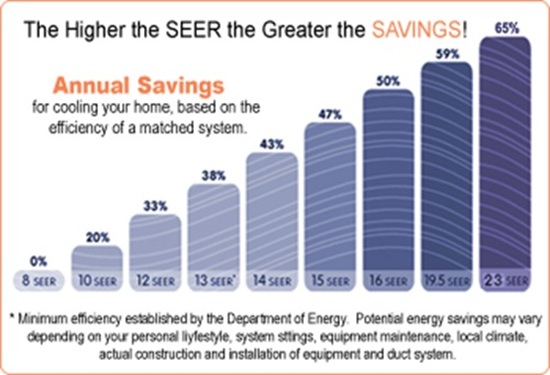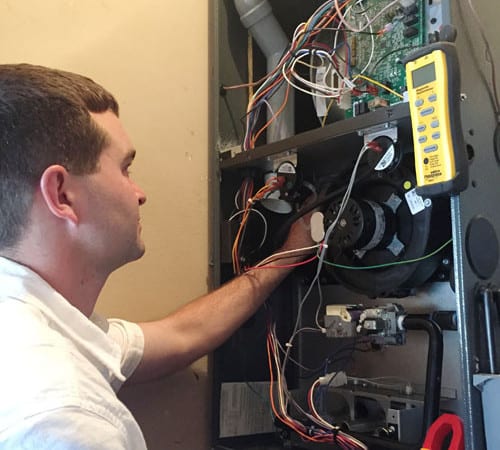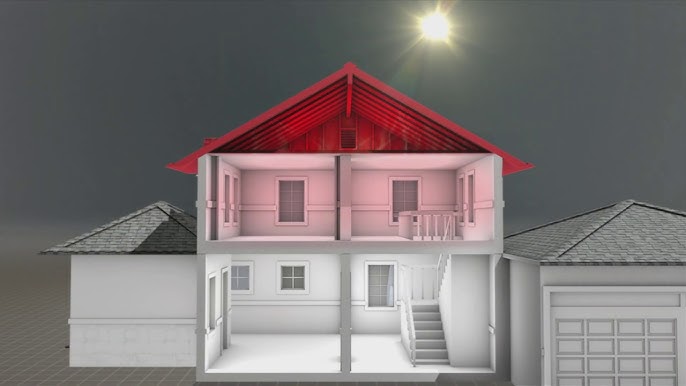
What is SEER? Every homeowner wants their home to be as energy efficient as possible especially during the hot summer months. If you are in the process of purchasing a new air conditioner one of the factors to consider is what SEER rating your new unit has. The SEER rating is determined by AHRI (Air Conditioning, Heating, and Refrigeration Institute). SEER stands for Seasonal Energy Efficiency Ratio and measures the cooling efficiency of your air conditioner. The SEER rating is often compared to a car’s gas mileage. A car with a higher gas mileage runs more efficiently. Similarly, an air conditioner with a higher SEER rating is more efficient. Furthermore, the SEER rating ensures that the system is productive, safe, and environmentally friendly. Although, the upfront cost of a unit with a high SEER rating may be higher, you will notice a decrease in the utility bills for your home or business. The following is a guide to help you understand SEER ratings and choose the most efficient ac unit for your home.
Choosing The Right SEER Rating
The minimum SEER rating for a residential system depends on what area of the United States you live in and what type of system you install. In California, the minimum SEER requirement is 14 SEER. It is not uncommon for people to consider a 14 SEER as having low efficiency. However, 14 SEER units are still considerably more efficient than the older ac units. The older ac units you most likely have in your home now, were rated around 8 or 9 SEER. Therefore, if you are purchasing a new ac unit, the efficiency is already drastically going up. If you do want to install a higher SEER system one viable option is to install a 16 SEER.
Minimum SEER Requirements
In addition to making sure you are complying with the minimum SEER requirements for your region, there are a few other factors to keep in mind to help you choose an ac unit with the right SEER rating. The ac unit must also be properly sized for your home. Proper sizing should only be completed by a trained and certified contractor. An ac unit that is not properly sized for your home, whether too big or too small, will not work efficiently. It will overcompensate, cause an increase in your utility bills and put additional strain on the unit.
Get The Most Out Of Your System
Furthermore, before you invest in a new system, you first should make sure that your home does not have any existing issues that could negatively affect the efficiency of your new unit. This means you will need to address any necessary improvements that could impact the temperature of your home. Most importantly, before you purchase a new ac unit, have an HVAC professional inspect your ductwork. Over time your ductwork could become damaged and could develop air leaks therefore causing a diminished efficiency of your AC Unit, even one with a high SEER rating. Sealing any leaks and adding duct and roof insulation can optimize the efficiency of your new unit. Furthermore, in order to get the advertised SEER rating it is best to replace your whole system both indoor and outdoor. This is called a matched system. Most importantly, the system must be installed correctly. If your new system is not installed correctly, you will lose efficiency.
Above all, before you purchase a new ac unit with a higher SEER rating, you should also consider how long you are expecting to stay in your home. It will take a few years before you see lower utility bills and be able to recoup your investment. If you are planning to sell your home in the near future a less expensive option may be better, although keep in mind a better unit typically will increase the resale value.
Give Us A Call
Give LA Construction Heating and Air a call today at (818) 341-3406 or contact us online. We can help you determine what the best SEER rating for your home is. When you understand key HVAC terms you can choose the most efficient air conditioner for your home. By choosing the most efficient and using less energy, you will also decrease your carbon footprint, therefore contributing to a healthier environment. Contact us today so we can help guide you through the process of purchasing new HVAC equipment. To learn more about the services we offer visit our homepage here.











































